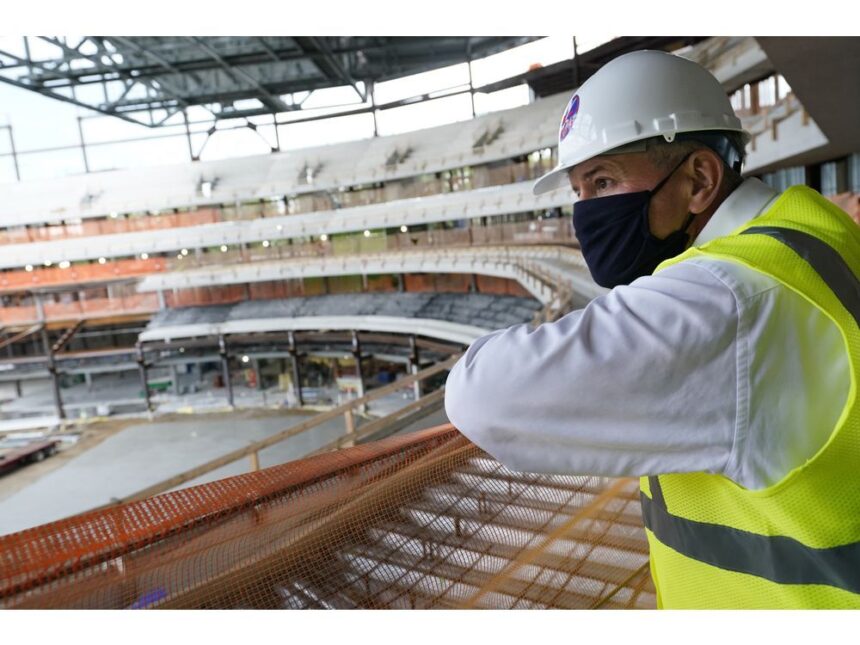I received a cache of Justice Department documents last week detailing a multi-year investigation into alleged bid-rigging at some of North America’s largest entertainment venues. This investigation has culminated in an indictment against Tim Leiweke, former head of Maple Leaf Sports & Entertainment (MLSE), who now finds himself at the center of a high-stakes legal battle that could reshape the sports entertainment industry.
Leiweke, who led MLSE from 2013 to 2015 before co-founding the Oak View Group, faces charges alongside five others in what prosecutors describe as a scheme to manipulate competitive bidding processes for arena management contracts. The indictment, filed in New York’s Eastern District Court, alleges the group conspired to predetermine which companies would win lucrative venue management contracts worth millions.
“This alleged conspiracy corrupted what should have been fair, competitive processes,” said Assistant Attorney General Jonathan Kanter of the Justice Department’s Antitrust Division in a statement released yesterday. “When companies rig bids, consumers and competing businesses suffer from artificial pricing and reduced options.”
According to court filings I’ve examined, the conspiracy allegedly stretched across major venues in multiple states between 2013 and 2022. The scheme allegedly involved coordinating which firms would submit intentionally losing bids, creating an illusion of competition while secretly determining winners in advance.
The investigation gained momentum after whistleblower complaints from competing venue management companies raised red flags about suspicious bidding patterns. These complaints prompted federal prosecutors to issue multiple subpoenas for communication records between the defendants.
Leiweke’s attorney, Michael Schachter of Willkie Farr & Gallagher, vigorously denied the allegations in our phone conversation yesterday. “Mr. Leiweke has built a reputation for integrity throughout his four-decade career. These allegations fundamentally mischaracterize legitimate business practices in the venue management industry,” Schachter told me.
The indictment marks a stunning turn for Leiweke, whose career includes leadership roles at Anschutz Entertainment Group and MLSE, where he oversaw the Toronto Maple Leafs, Raptors, and Toronto FC. His transition to Oak View Group positioned him as a major player in arena development across North America.
Rebecca Meiklejohn, the lead prosecutor assigned to the case, declined to comment on specific evidence but confirmed to me that the investigation involved reviewing thousands of emails and text messages between the defendants discussing bid strategies.
The American Bar Association’s Antitrust Law Section has long noted that bid-rigging prosecutions carry particularly severe consequences. “These cases often result in substantial criminal penalties because they directly undermine the competitive process,” explained antitrust attorney Jenifer Simmons, who specializes in competition law but is not involved in this case.
The indictment details meetings in Chicago, Los Angeles, and New York where the defendants allegedly coordinated their approach to upcoming venue contracts. In one instance cited in the documents, defendants reportedly discussed which company would “take a dive” on a specific bid opportunity.
I reviewed financial records from several affected venues showing contract values ranging from $15 million to over $100 million for long-term management agreements. If convicted, defendants could face up to 10 years in prison and fines up to twice the amount gained from the illegal conduct or twice the loss suffered by victims.
Industry watchdog Sports Facility Analytics published research last year identifying unusual patterns in arena management contract awards. Their report, which I obtained through a records request, noted that certain companies were winning contracts despite submitting proposals with less favorable terms than competitors.
“The concentration of management contracts among a small group of interconnected firms raised serious questions about market competitiveness,” wrote analyst Jordan Henderson in the report, which examined 37 venue contracts awarded between 2015 and 2022.
For municipalities that own these venues, the alleged scheme would have effectively eliminated their ability to secure competitive pricing for taxpayer-funded facilities. New York State Comptroller Thomas DiNapoli has announced a review of all state venue contracts potentially affected by the scheme.
“Public infrastructure contracts must be awarded based on merit and value, not through backroom deals,” DiNapoli stated in a press release issued Tuesday.
The case has also sparked concern at the Competition Bureau of Canada, which confirmed it is “monitoring the situation closely” but would not comment on whether it has launched its own investigation into Leiweke’s activities during his tenure at MLSE.
Sports economist Andrew Zimbalist of Smith College told me the case highlights how consolidated the venue management industry has become. “These are complex public-private partnerships involving hundreds of millions in public funds. The alleged conduct would represent a profound breach of public trust,” Zimbalist said.
Oak View Group issued a statement emphasizing that the charges relate to “alleged individual conduct” rather than company policies. The company has placed Leiweke on administrative leave pending resolution of the case.
The first court appearance is scheduled for next month in New York, where Leiweke and his co-defendants will enter formal pleas. The case has been assigned to Judge Raymond Dearie, known for his handling of complex white-collar crime prosecutions.
As arena development continues to boom across North America, with billions in public and private investment, this case may force a rethinking of how these massive contracts are awarded and overseen. For communities investing in these facilities, the stakes couldn’t be higher.






